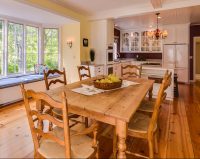Furnished holiday lettings – period of grace election
The Government has made available an unprecedented amount of support for businesses and individuals during this pandemic. Not only have individuals suffered personal loss, many businesses have suffered in one way or another, some severely and some perhaps not quite so much with some potentially feeling the impact a lot later.
One of the industries that has been hardest hit is hospitality and many farms having been encouraged to diversify have created a Furnished Holiday Letting (FHL) business utilising existing spare cottages or investing heavily in converting farm buildings. With the restriction of movement of people clearly no-one has been able to take up bookings, which from Easter time would have usually been the start of the busiest period.

9th July 2020
For those FHL business that have a business rating, even if eligible for the Small Business Rates Relief, were entitled to a local authority grant. Those who had no business rating were not eligible. For those that offered Bed & Breakfast services may well have benefited from the Self-Employed Income Support Scheme. There is also the ability for those to acquire bounce back funding to keep them on track during this lean time.
However, we have come across instances where properties had guests in occupation at the point of lockdown, but consequently have been unable to move out of the property. This then led onto considering how this income would be treated under the strict FHL provisions.
The income derived from property can be treated as FHL if the property is let furnished and the letting falls within the following requirements:
- The property must be made available for at least 210 days in the period as a furnished holiday letting. This therefore leaves out of the year another 155 days that could be occupied as something else
- Within the period selected of the 210 days, it must on average be let for 105 days or more and if you have more than one property you can use an average of all the properties to fulfil that requirement
- There is a requirement that during that letting period no one individual has occupation for more than 31 days.
Income derived from FHL is only a deemed trade, but nevertheless can be income of, say, the spouse running the operations even though the property may be beneficially owned by the parties to the marriage.
If you are involved in an FHL business, you may therefore find that for the tax year ended 5 April 2021 you fail to meet the above provisions. For example, letting periods of longer than 31 days should not be counted for the 105 days occupancy test. Likewise, letting the property to friends or relatives at zero or reduced rates is not a commercial let. However, if you have more than one FHL you can average the properties to fulfil the occupancy test for both.
Whilst many FHL businesses may well consider they will fail the tests above, HMRC Guidance HS253 mentions that whilst you do not count longer-term lets of more than 31 days, if the 31 days is exceeded because something unforeseen happens. For example, if the holidaymaker either:
- falls ill or has an accident, and cannot leave on time
- has to extend their holiday due to a delayed flight
then this period of occupation can be counted. We are hopeful HMRC will consider the current situation is not normal circumstances and they should be able to count the days within the 105 days target.
If you have been unable to have any occupation this is when the period of grace election would come in. You could make an election if the property qualified as FHL in the previous year and the only reason it didn’t qualify in the year of the election was due to the failed occupancy test. The election can be made for two consecutive years, but you must make it in the first year to qualify for the second year. It would normally be made on the self-assessment tax return, but you can make it separately within 12 months of the 31 January following the tax year of claim i.e. 2020/21 tax year claim to be made by 31 January 2023.
If you believe you fall within this criteria this could give rise to some unexpected tax issues when coming to deal with your self-assessment tax return for the year ended 5 April 2021 you should speak to you Old Mill adviser or email enquiries@om.uk.
As with all the measures that have been issued through this pandemic, our website has comprehensive help and guidance and links through to the current Government guidelines and we would recommend you regularly refer to our COVID-19 hub.
